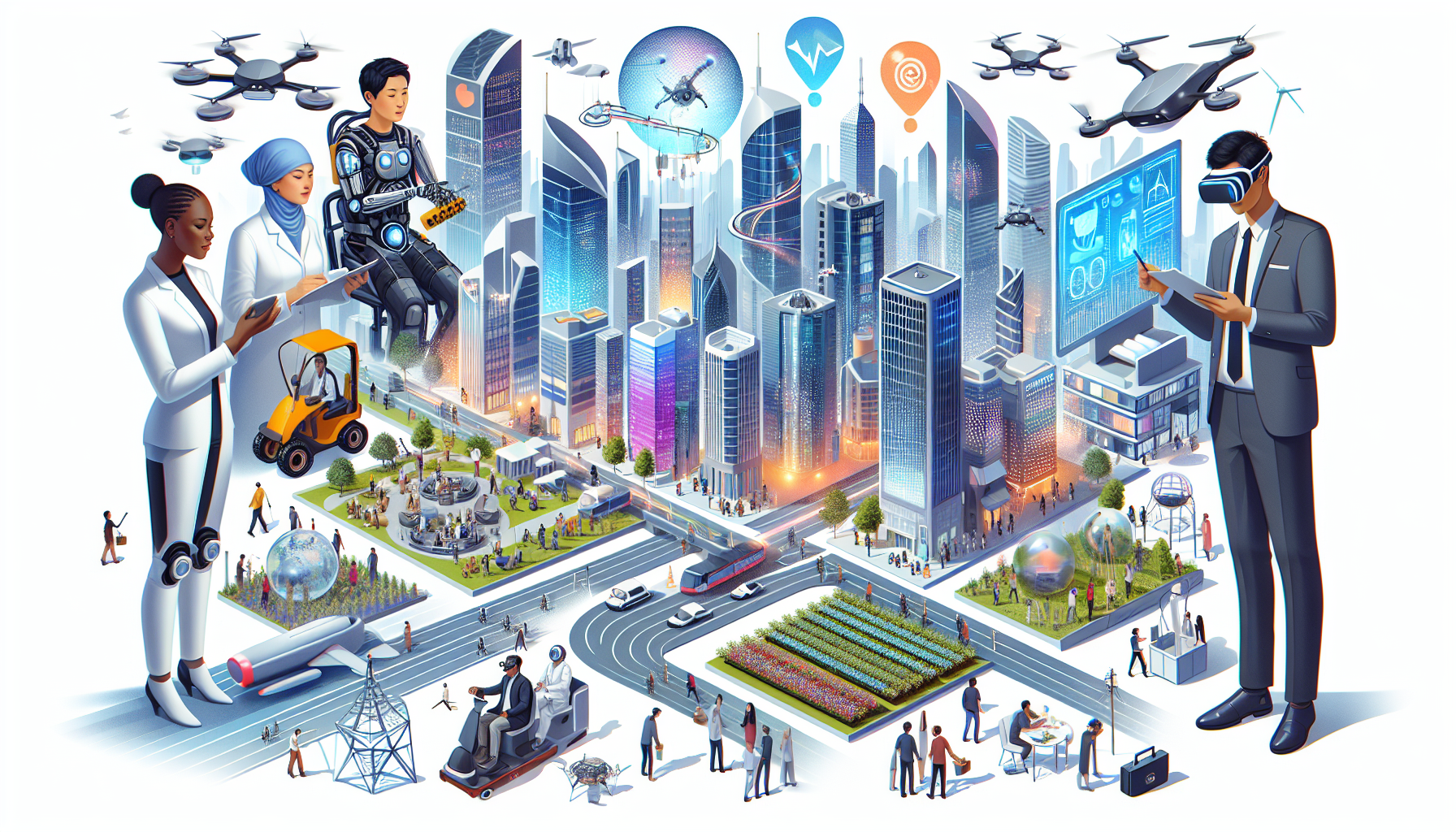The jobs of the future are being shaped in the present. The technology revolution began in earnest, shaping an exciting and tech-driven future for humanity. The trend is already showing us the kind of jobs that will be most relevant in the foreseeable future.
If dinosaurs had the technology to know that asteroids were headed for them, they could have prepared bunkers in anticipation, to survive the cataclysmic event.
Are you ready to future-proof your career and stay ahead of the game? In an ever-evolving job market, it’s essential to be aware of the hottest jobs of the future.
From artificial intelligence to renewable energy, technology, and innovation are reshaping industries at an unprecedented rate. In this fast-paced and dynamic landscape, staying relevant and competitive is key.
That’s why I’ve compiled a list of the 20 hottest jobs of the future that are set to dominate the market. Whether you’re a recent graduate looking to kickstart your career or a seasoned professional aiming to make a pivot, these in-demand roles offer exciting opportunities for growth and success.
Want to discover how you can future-proof your professional journey? Let’s dive in and unlock the secrets to a thriving career in the years to come!
Read Also: Personal Growth Unveiled: The Transformative Power of Embracing Solitude
The importance of future-proofing your career
In today’s rapidly changing job market, the need to future-proof your career has never been more crucial. Technology advancements, automation, and globalization are transforming industries, making certain jobs obsolete while creating new and exciting opportunities.
To ensure long-term success and job security, adapting and staying ahead of the curve is essential.
Future-proofing your career involves identifying the skills and knowledge in high demand in the coming years. By focusing on these areas, you can position yourself as a valuable asset to employers and increase your chances of career growth and advancement.
Embracing continuous learning, staying agile, and actively seeking out opportunities to upskill are all vital components of future-proofing your career.
Read Also: Superior Productivity Tools: 14 Top-Notch Applications For Business Leapfrog
The methodology behind identifying the hottest jobs of the future
Identifying the hottest jobs of the future requires a comprehensive analysis of industry trends, technological advancements, and market demands. By examining the current landscape and projecting future developments, experts can forecast which jobs will be in high demand.
This analysis takes into account factors such as emerging technologies, market growth potential, and societal shifts.
The goal was to identify roles that are not only in high demand currently but also have a promising outlook for the coming years. These jobs span various industries and sectors, showcasing the diverse opportunities available in the rapidly evolving job market.
Read Also: The Power of Micro-Habits: How Tiny Actions Can Lead to Big Transformations
Top 20 hottest jobs of the future

- Data Scientist: With the ever-increasing importance of data-driven decision-making, data scientists are in high demand. They analyze complex datasets, extract insights, and develop algorithms to solve business problems.
- Artificial Intelligence Engineer: As AI continues to evolve, the need for skilled professionals who can design and develop AI systems is on the rise. AI engineers create intelligent machines and algorithms capable of learning and making decisions.
- Cybersecurity Analyst: With the increasing number of cyber threats, organizations need experts who can protect their systems and data. Cybersecurity analysts identify vulnerabilities, implement security measures, and respond to security incidents.
- Robotics Engineer: As automation becomes more prevalent, robotics engineers are needed to design, build, and maintain robots and automated systems. They work on developing advanced robotics technologies for various industries.
- Digital Marketing Specialist: In the digital age, businesses rely on digital marketing to reach their target audience. Digital marketing specialists develop and implement online marketing strategies to drive brand awareness and generate leads.
- Renewable Energy Engineer: With the growing focus on sustainability, renewable energy engineers play a crucial role in developing and implementing clean energy solutions. They work on projects related to solar, wind, and other renewable energy sources.
- UX/UI Designer: User experience (UX) and user interface (UI) designers create intuitive and visually appealing digital experiences. They ensure that websites, apps, and other digital products are user-friendly and visually appealing.
- Augmented Reality/Virtual Reality Developer: As AR and VR technologies gain popularity, developers who can create immersive experiences are in high demand. AR/VR developers design and develop applications for gaming, training, and other industries.
- Genetic Counselor: With advancements in genetics and personalized medicine, genetic counselors provide guidance and support to individuals and families with genetic conditions. They help patients understand their risk factors and make informed healthcare decisions.
- Environmental Scientist: Environmental scientists study the environment and work on solutions to address environmental issues. They conduct research, analyze data, and develop strategies to protect and conserve natural resources.
- Data Privacy Officer: With the increasing concerns about data privacy, organizations need professionals who can ensure compliance with privacy regulations. Data privacy officers develop and implement policies to protect sensitive information.
- Health Informatics Specialist: Health informatics specialists bridge the gap between healthcare and technology. They manage and analyze healthcare data to improve patient care, optimize processes, and enhance decision-making.
- Virtual Reality Architect: Virtual reality architects design and develop virtual environments for various applications, including gaming, architecture, and simulations. They create immersive experiences that replicate real-world scenarios.
- Biomedical Engineer: Biomedical engineers combine engineering principles with medical sciences to develop innovative healthcare technologies. They design and build medical devices, prosthetics, and imaging systems.
- Blockchain Developer: Blockchain developers create decentralized applications and systems using blockchain technology. They work on implementing secure and transparent solutions for industries like finance, supply chain, and healthcare.
- E-commerce Specialist: As online shopping continues to grow, e-commerce specialists help businesses establish and manage their online presence. They optimize websites, develop online marketing strategies, and enhance the overall customer experience.
- Sustainability Manager: Sustainability managers develop and implement sustainable strategies for organizations. They focus on reducing environmental impact, improving resource efficiency, and promoting social responsibility.
- Nanotechnologist: Nanotechnologists work at the nanoscale, manipulating materials and structures to develop new technologies. They contribute to advancements in electronics, medicine, energy, and other fields.
- Machine Learning Engineer: Machine learning engineers develop and deploy machine learning models and algorithms. They work on training machines to learn from data and make predictions or decisions.
- Virtual Reality Therapist: Virtual reality therapists use VR technology to provide therapeutic interventions for mental health conditions. They create virtual environments that help patients overcome phobias, manage stress, and improve overall well-being.
Read Also: 5 Ways to Curb Collaborative Overload in the Workplace
Skills and education needed for these jobs
Technical abilities, interpersonal skills, and the appropriate education are essential for success in the jobs of the future. There are certain commonalities across these roles even though the precise criteria differ depending on the job.
Technical skills such as data analysis, programming, artificial intelligence, cybersecurity, and digital marketing are highly valued in today’s job market. These skills can be acquired through formal education, online courses, or self-study. Additionally, having a solid foundation in mathematics and statistics is beneficial for many of these roles.
Soft skills, such as communication, problem-solving, critical thinking, and adaptability, are equally important. These skills enable professionals to collaborate effectively, navigate complex challenges, and continuously learn and adapt to new technologies and trends.
In terms of education, a bachelor’s degree is often the minimum requirement for entry-level positions in these fields. However, advanced degrees, such as master’s or doctoral degrees, can provide a competitive edge and open up opportunities for leadership roles or specialized positions.
Read Also: 6 Exciting Benefits of Working from Home in 2023
How to prepare for a career in the jobs of the future
Preparing for a career in the hottest jobs of the future requires a proactive approach and a commitment to lifelong learning. Here are some steps you can take to position yourself for success:
- Identify your interests and strengths: Start by exploring the areas that align with your interests and strengths. This will help you find a career path that you are passionate about and where you can thrive.
- Research and understand the job market: Dive deep into the job market to gain insights into the jobs of the future. Understand the skills, qualifications, and experience required for these roles.
- Acquire relevant skills and knowledge: Once you have identified the skills needed for your desired career, invest in acquiring them. Take advantage of online courses, workshops, boot camps, and certifications to gain expertise in your chosen field.
- Gain practical experience: Seek out opportunities to apply your skills in real-world scenarios. Look for internships, freelance projects, or volunteer work that can provide hands-on experience and help you build a portfolio.
- Network and build connections: Networking is crucial in any field, and it can open doors to new opportunities. Attend industry events, connect with professionals in your desired field, and join relevant online communities to expand your network.
- Stay updated on industry trends: The job market is constantly evolving, so it’s important to stay up-to-date with the latest trends and technologies in your field. Subscribe to industry publications, follow thought leaders, and join professional organizations to stay informed.
- Continuously learn and adapt: Embrace a growth mindset and be open to learning new things. The jobs of the future require professionals who can adapt to changing technologies and market demands. Seek out opportunities for continuous learning and upskilling throughout your career.
Read Also: 7 Must-dos to Build a Successful Career
Resources and courses to develop skills for these jobs
Developing the skills needed for the jobs of the future is easier than ever, thanks to the abundance of online resources and courses available. Here are some reputable platforms where you can find courses and resources to enhance your skills:
- Coursera: Coursera offers many courses from top universities and institutions. They have courses in data science, AI, cybersecurity, digital marketing, and many other fields.
- edX: edX is a platform that partners with leading universities and organizations to offer online courses in various disciplines. They have courses in data science, cybersecurity, environmental science, and other relevant fields.
- Udemy: Udemy offers more than 201,000 video courses in different fields including coding, machine learning, web development, cloud solutions, etc.
- LinkedIn Learning: LinkedIn Learning provides a vast library of online courses taught by industry experts. They cover a wide range of topics, including UX/UI design, digital marketing, and data analysis.
- Codecademy: Codecademy is a platform that focuses on teaching coding and programming skills. They offer courses in Python, Java, JavaScript, and other programming languages.
- Khan Academy: Khan Academy offers free online courses in subjects such as math, science, and computer programming. Their courses provide a solid foundation for technical skills.
Remember to explore other resources such as books, podcasts, and industry-specific websites to supplement your learning journey. Continuous learning and self-development are key to success in the hottest jobs of the future.
Read Also: Wondering How To Make Your Decision Making Rock? Read This!
Industries and sectors driving the demand for these jobs
The demand for the hottest jobs of the future is being driven by several industries and sectors that are undergoing significant transformations. Here are some of the key industries that are fueling the demand for these roles:
- Technology: The technology sector is at the forefront of innovation, driving the demand for AI engineers, cybersecurity analysts, data scientists, and other tech-related roles.
- Healthcare: Advancements in healthcare technology and personalized medicine are creating opportunities for genetic counselors, health informatics specialists, and virtual reality therapists.
- Energy: The shift towards renewable energy sources is boosting the demand for renewable energy engineers and sustainability managers.
- E-commerce: With the growth of online shopping, e-commerce specialists are in high demand to help businesses thrive in the digital marketplace.
- Finance: The finance industry is embracing blockchain technology, leading to the need for blockchain developers and experts in data privacy and security.
- Environmental: Environmental scientists and sustainability managers play a crucial role in addressing climate change and promoting sustainable practices across industries.
These are just a few examples of industries driving the demand for the hottest jobs of the future. As technology continues to advance and societal needs evolve, new opportunities will emerge in various sectors.
Read Also: Wondering How To Make Your Decision Making Rock? Read This!
Challenges and potential roadblocks in pursuing these careers
Now even though these jobs of the future offer exciting prospects, there are also challenges and potential roadblocks that aspiring professionals may face. It’s important to be aware of these challenges and develop strategies to overcome them. Some common challenges include:
- Rapidly changing technology: The fast pace of technological advancements means that professionals in these roles must continuously update their skills and stay current with the latest trends. This requires a commitment to lifelong learning and adaptability.
- Competitive job market: As these roles gain popularity, the competition for positions can be fierce. To stand out, focus on acquiring in-demand skills, gaining practical experience, and building a strong professional network.
- Skill gaps: Some of the hottest jobs of the future require highly specialized skills that may not be readily available in the job market. Addressing skill gaps may involve pursuing advanced education, seeking out niche training programs, or gaining practical experience through internships or personal projects.
- Ethical considerations: As technology evolves, ethical considerations become increasingly important. Professionals in these roles must navigate ethical dilemmas related to data privacy, AI ethics, and the potential societal impact of their work.
- Resistance to change: Implementing new technologies and approaches can face resistance from organizations and individuals. Professionals in these roles may need to navigate organizational dynamics and effectively communicate the value of their work.
By being aware of these challenges and proactively addressing them, aspiring professionals can position themselves for success in the jobs of the future.
Conclusion
Future-proofing your career is essential in today’s rapidly changing job market. By identifying the hottest jobs of the future, acquiring the necessary skills and education, and staying adaptable, you can position yourself for long-term success.
The 20 hottest jobs of the future above offer exciting opportunities for growth and innovation across various industries. Embrace continuous learning, stay ahead of the curve, and be ready to adapt to emerging technologies and market trends. The future is yours to conquer – so seize the opportunity and future-proof your career today!



